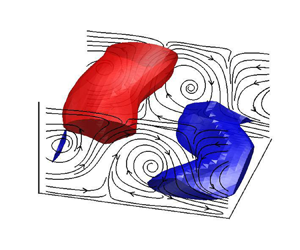Published online by Cambridge University Press: 24 March 2022

In the present study, a set of physics-informed and data-driven approaches are examined towards the development of an accurate reduced-order model for a turbulent plane Couette flow. Based on the utilisation of the proper orthogonal decomposition (POD), a particular focus is given to the development of a reduced-order model where the number of POD modes are not large enough to cover the full dynamics of the given turbulent state, the situation directly relevant to the reduced-order modelling for turbulent flows. Starting from the conventional Galerkin projection approach ignoring the truncation error, three approaches enhanced by both physics and data are examined: (1) sparse regression of the POD-Galerkin dynamics; (2) Galerkin projection with an empirical eddy-viscosity model; (3) Galerkin projection with an optimal eddy viscosity obtained from a newly proposed sparse regression – an idea applying the sparse identification of nonlinear dynamics framework to an eddy-viscosity model. The sparse regression of the POD-Galerkin dynamics does not perform well, as the number of POD modes for the given chaotic dynamics appears to be too small. While the unsatisfactory performance of the Galerkin projection model with an empirical eddy viscosity is observed, the newly proposed approach, which combines the concept of an optimal eddy-viscosity closure with a sparse regression, more accurately approximates the chaotic dynamics than the other reduced-order models considered. This is demonstrated with the mean and time scales of the POD mode amplitudes as well as the first- and second-order turbulence statistics.